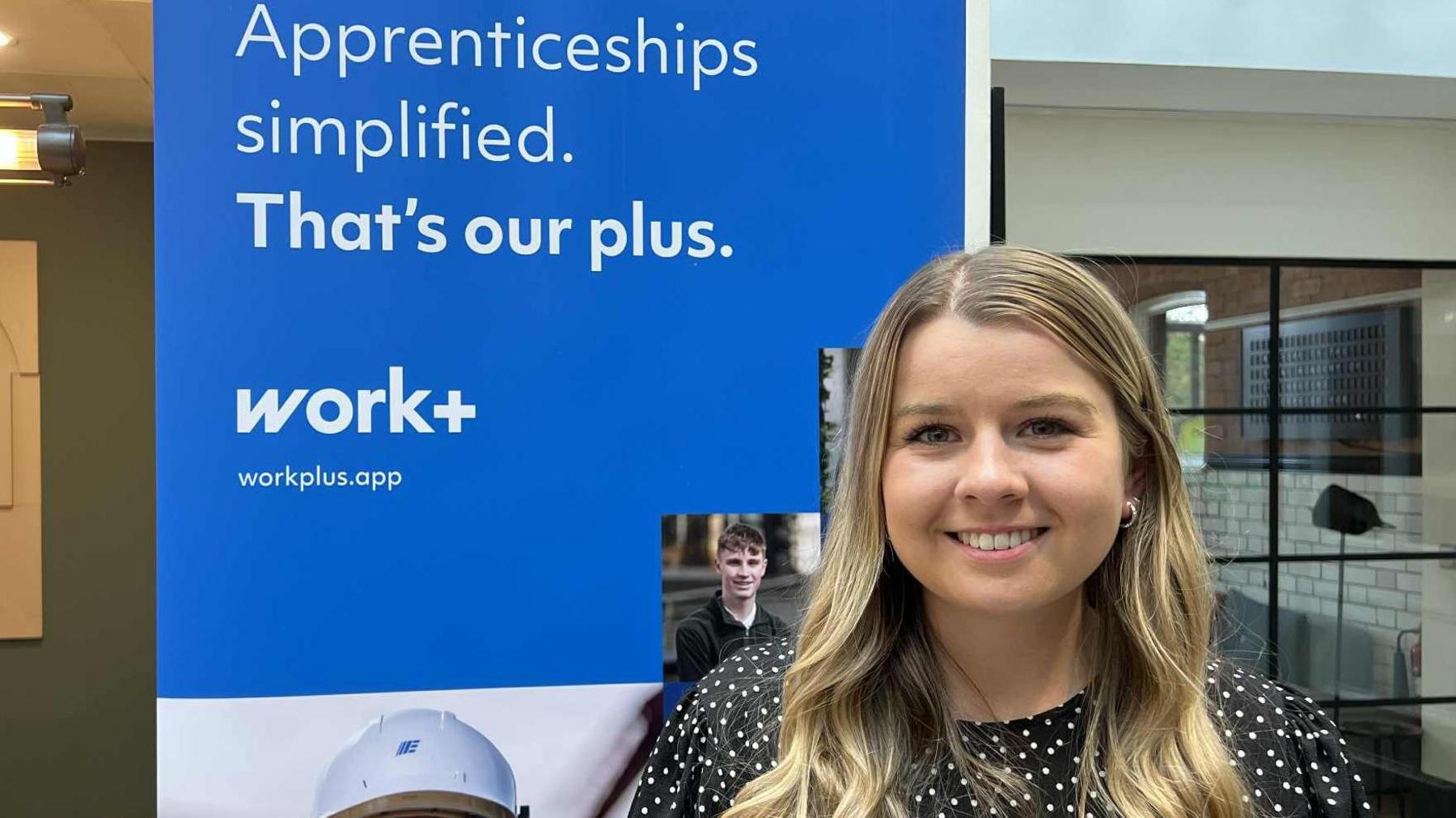
Image caption,
Ryan Beggs hopes to complete an apprenticeship in bricklaying
Businesses need more incentives from the government to take on apprentices, a Belfast mother has said.
Helen Marks’ son Ryan Beggs has been enrolling in apprenticeship courses at Belfast Metropolitan College for the past two years but has been unable to find an employer to take him on.
He was previously employed with a construction business, but they were unable to keep him on as an apprentice as they claimed there could be added costs and lengthy training.
“I think the government should be helping employers, a lot of them are small or medium-sized businesses, they have overheads and insurance to pay for,” Ms Marks told BBC News NI.
Ryan said the entire process has been “quite stressful” as he is keen to “get sorted” and gain a qualification.
“When I first started, my plan was to be done my apprenticeship this year, and I haven’t even started one yet, once I start one it’s going to be another two years.”
Department for Economy (DfE) figures show the number of people starting apprenticeship programmes has risen by about 40% in five years.
“However, given the success and growing popularity of apprenticeships over the past number of years, this means that securing employment is more competitive than ever,” a department spokesperson said.
‘It’s not easy’
“The government need to have some sort of way of supporting employers, so that when an employer looks at an apprentice, they see a positive thing, not a negative thing, not something that’s going to pull them back,” she said.
“At the minute it’s not an easy process.”

Image caption,
Ms Marks described her son’s search for an employer as “really rough” as he is so enthusiastic
Apprenticeships offer an opportunity to earn as you learn, across a wide range of sectors, for people aged 16 and over.
To undertake an apprenticeship, learners are required to be employed for a minimum of 21 hours per week, including off-the-job training.
Traditional apprenticeships saw a jump from 5,811 learners in 2018/19 to 7,519 in 2023/24, while higher level apprenticeships in further education colleges grew from 450 to 955 over the same period.
‘I did things the wrong way’
Nicole Cameron was an occupational therapist for six years before deciding she wanted a change in career.
She is now a higher level apprentice in event management, but she also struggled to find an employer.
“I sort of did things the wrong way around, finding the course first then had to find an employer,” she said.

Image caption,
Nicole Cameron is a higher level apprentice student
Nicole said businesses were apprehensive, her skills were health service based, and she needed to convince them she was a good fit.
“Belfast Met were excellent and helpful in trying to help me secure employment.”
She believes incentives could make taking on apprentices more appealing to businesses.
Nicole found work with FairyTales Wedding Specialists in Coleraine.
Owner Darran Wallace said Nicole had been a “real asset”, but if he was to take on an apprentice in future he would look for more support.
‘A complex space’
Fewer than 10% of employers in Northern Ireland currently hire apprentices, according to Lucy Marshall from Workplus.
Workplus connects job seekers with employers by collaborating with businesses across various sectors.
Ms Marshall said there is increasing interest in both traditional and higher level apprenticeships, with Workplus experiencing “double” the number of applications from last year.
“We are working with employers to help them navigate the space. It’s a complex system and it can be hard for employers to know where to start. But there is an opportunity for employers to work together,” she said.

Image caption,
Lucy Marshall is Community Manager at Workplus
Siobhan Lyons, director of development and partnerships at Belfast Met, said there has been a “huge” growth in people taking on higher level apprenticeships over the past five or six years.
The college initially had 40 learners when higher apprenticeships were introduced in 2018. This has grown to 400 higher apprentices last year.
“It is a commitment for an employer to take on an apprentice…but the benefits of that are huge in order to attract that pipeline of talent into their business,” Ms Lyons said.

Image caption,
Siobhan Lyons says it is a commitment for employers to take on apprentices but the benefits are “huge”
DfE said apprenticeships, external are a “key part of the minister’s vision for the economy”.
The department funds training costs, offers incentive payments to employers and recently launched a three-year apprenticeship action plan, external aimed at creating opportunities and addressing barriers.
In addition, the Construction Industry Training Board offers a series of grants to further support employers of apprentices in the construction sector.
While demand is growing and places are competitive, the department said new measures such as a challenge fund and local apprenticeship navigators “will support more businesses to take on apprentices”.
DfE added it has been working in partnership with employers and education providers to “help align apprenticeships with non-employed vocational pathways so that learners can complete their learning and help progress to higher levels or employment”.
